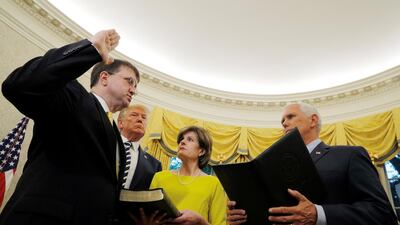When I first moved to the US, I noticed a woman at the next table at lunch, proudly wearing her military uniform. Several people came up to thank her for her service.
Coming from France, I was surprised. Of course, French people celebrate their troops on Bastille Day during the military parade on the Champs Elysees.
But on a daily basis, most French people do not pay this kind of attention and respect to those who fight to protect our country.
The US has a strange way of dealing with soldiers. They are treated as role models and heroes while deployed and on active duty.
When they return as war veterans, however, most of them not only suffer from the consequences of war but also from a lack of consideration and attention that contrasts with the way they were treated just a few months before.
There are currently more than 18 million veterans in the US, too many of whom are suffering from mental health issues that are not being taken care of properly.
Earlier this year the US National Academy of Sciences, Engineering and Medicine published a report on this issue entitled Evaluation of the department of veterans affairs mental health services. This report indicated nearly four million US service members took part in recent wars.
There seems to be an unprecedented increase in mental health-related cases among the veterans of these conflicts.
Yet the report indicated that the US Department of Veterans Affairs needs to switch gears to properly address a veterans’ mental health crisis and includes evidence-based recommendations to improve veterans’ equitable access to brain healthcare.
There is also an emphasis on the need to leverage advanced tech, including virtual reality (VR) in providing innovative solutions to improve mental healthcare for veterans.
_________________________
Read more from Olivier Oullier:
Why you just can't get that song out of your head
Neuroscience can help explain football fans' behaviour
London cabbies know exercising your brain is the best way to avoid accidents
_________________________
VR is a powerful tool when it comes to recreating environments and being able to control parameters.
In the case of veterans, it allows a gradual transition from the stress of the warzone to civilian life.
This is what Crusades 22, a non-profit organisation providing integrative and complementary care for veterans and active soldiers with post-traumatic stress injuries (PTSI) is working on, in collaboration with Dr Albert Rizzo, director of the University of Southern Califonia’s Institute of Creative Technologies and several tech companies.
Dr Rizzo is a leading light in applying VR to improve treatment.
My company first joined forces with the Crusades 22 team and Dr Rizzo last year in San Diego, California, during the Navy Seal Foundation Impact Forum, where we demonstrated how the combination of VR and some of our mobile neurotechnology could be used to provide a portable, scalable and affordable solution that could disrupt access to mental healthcare for veterans in the near future.
I joined Dr Rizzo and many other distinguished individuals on the board of directors of Crusades 22 to work on a project called The Forging – the organisation’s protocol to help soldiers returning home with cognitive and emotional challenges associated with PTSI.
It enables them to benefit from real-time immersion that is both rehabilitative and recreational and motivates them to participate in tech-enabled self-care.
Brian Hillard, the executive director of Crusades 22, says it is developing artificial intelligence to combine neuroinformatics, biorhythms and virtual reality to create customised tools for veterans to comfortably reintegrate in the community.
I am mindful that the story I share here is US-centric, especially considering there are veterans all over the world, as illustrated by the work of the World Veterans Federation (WVF).
The WVF is composed of organisations from more than 120 countries and represents 45 million veterans worldwide.
All these veterans’ organisations work hard to deal with a key societal issue: repairing the damage human beings do to each other during wars.
But effort should not be restricted to active soldiers and veterans.
Traumatic consequences are experienced by their friends, families and the civilians who are injured or lose people they love.
As illustrated by the work of Crusades 22 and many other organisations in the world, the Fourth Industrial Revolution should play a key role in accelerating equitable access to brain healthcare for veterans and all of those who suffer the dramatic consequences and life-altering problems associated directly and indirectly with conflicts globally.
Leveraging VR and neurotech is key but will not be successful without empathy for those who suffer.
Professor Olivier Oullier is the president of Emotiv, a neuroscientist and a DJ


